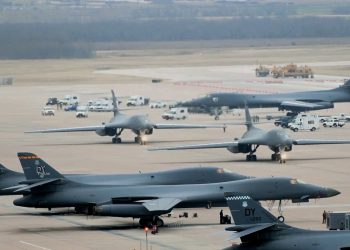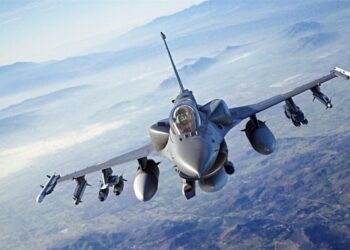US Air Force,
GEILENKIRCHEN, Germany: Nearly 10,000 German, Dutch and Belgian citizens flooded the tarmac on Geilenkirchen NATO Air Base June 16 and 17 to celebrate the successful legacy of a multinationally operated airplane that began flying out of the northern German community in February 1982.
The event boasted a multicultural array of entertainment and technology symbolic of the 16 nations who have worked together over the last quarter-century to contribute to the NATO alliance's air defense capability.
“There is no other internationally integrated crew anywhere in the world like the one we have here at the component,” said Brig. Gen. Stephen P. Schmidt, the NATO Airborne Early Warning and Control Force E-3A component commander, .
“Multinational crewmembers from nations that would normally never have the opportunity to work together are flying side-by-side every day and it has worked out great,” the general said.
The northern-Germany based E-3 Sentry component that was initially activated to provide air defense capabilities against the potential threat of low-flying Warsaw Pact aircraft, is now the only permanently assigned member of the rotationally organized NATO Response Force, or NRF. As an NRF member, the component is now charged with being capable of responding to any global threat within five days.
Staying viable to meet those threats, the Component boasts the most modernized jet in the entire AWACS inventory. Many interested local citizens stood in line nearly 40 minutes enduring rain showers to see that technology.
Standing by to field questions to the varied groups coming onboard were crewmembers speaking Dutch, German, English, French and Italian. The crew worked in concert to conduct guided tours of the sophisticated plane.
“It's definitely a unique experience,” said Capt. Chris Pittman, flight commander and an E-3 navigator. “You can have up to 14 different countries all flying on the jet, communicating on the radio, executing the mission and they get it done.”
The component consists of five main functional wings, each commanded by a colonel from a variety of NATO nations. The position of the component commander alternates between a German and American brigadier general. Overall manning of the component consists of 3100 multinational military and civilian members.
During a break between guiding tours, Raffaello Morganella, an Italian air force communications specialist, said his former assignments in NATO made working with members of different cultures easy. It was learning to perform his job in the air that was most challenging.
“I was used to working by myself on the ground. Now, having to perform a similar job on this plane, I have to think about how my decisions and actions affect the entire crew,” he said.
The variety of missions the component is tasked to perform is as diverse as its crew. Most recently, the organization supported anti-terrorism missions for the G8 Summit and a presidential visit. The NATO airborne, surveillance, command and control aircraft planes also provided top cover for the summer Olympic Games in Athens, the funeral of Pope John Paul II, and support for victims of Hurricane Katrina.
The unit was also tasked to provide air defense over the United States following 9-11 and was heavily involved during the Balkan War.
“We're here today to celebrate the long service and support we've experienced here from the nations that support us and the local communities that support us,” General Schmidt said. “We've had a long record of flying success and mission accomplishment and we thought it was time to celebrate that.”









